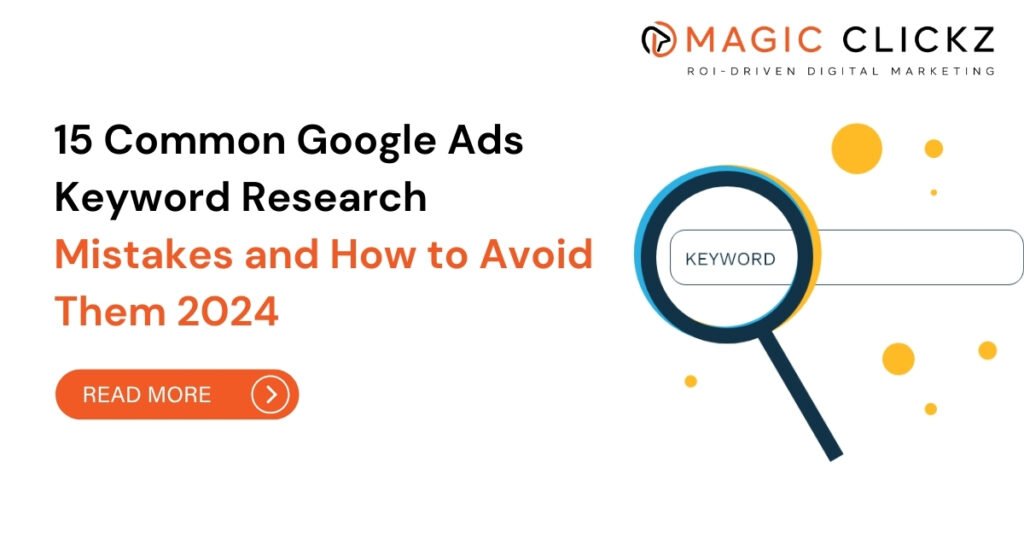
Running effective and targeted Google Ads can help any business reach its visibility, traffic and conversion goals. However, many advertisers make common mistakes during Google Ads keyword research, hindering their success. This article discusses ten of these Google Ads keyword research mistakes and provides actionable strategies to avoid them, ensuring your PPC campaigns are both effective and efficient.
Table of contents:
- Targeting Competitor Brand Keywords Without a Plan
- Ignoring Negative Keywords
- Overlooking Long-Tail Keywords
- Failing to Conduct Thorough Google Ads Keyword Research
- Not Segmenting Keywords by Intent
- Not Monitoring Keyword Performance Regularly
- Relying Solely on Broad Match Keywords
- Ignoring Location-Based Keywords
- Not A/B Testing Keywords and Ads
- Not Analysing Results Post-Campaign
- Focusing Too Much on Volume Instead of Intent
- Not Reviewing Keyword Performance Metrics
- Ignoring Seasonal Trends
- Forgetting About Mobile Optimization
- Failing to Use Keyword Research Tools
Avoid These Common Google Ads Keyword Research Mistakes to Maximise Your PPC Ads Success
1. Targeting Competitor Brand Keywords Without a Plan
Many advertisers jump at the chance to bid on competitor brand keywords, believing this strategy will bring in quick traffic to your ad campaigns. However, doing this without a clear plan or proper Google Ads keyword research mistakes can lead to wasted ad spend and minimal returns on ad spend.
Why This is a Mistake:
Targeting competitor keywords can be costly and ineffective if you lack a strategy. Competing against established brands often results in high Cost-Per-Click (CPC) rates. Without a compelling value proposition, your ads may not convert as desired, leading to frustration and reduced ROI.

How to Avoid This Mistake:
- Research Competitor Positioning: Understand what makes your competitors successful. Analyse their ad copy, landing pages and value propositions to determine how you can differentiate your offering. Tools like SEMrush or Ahrefs can provide insights into competitor keywords and performance.
- Create Unique Selling Propositions (USPs): Develop strong USPs that clearly communicate why a potential customer should choose your business over competitors. Ensure that your ads highlight these USPs, as this can significantly improve your ad’s relevance and conversion rates.
- Use Competitor Keywords Sparingly: Focus on a small number of competitor keywords and monitor their performance. If they aren’t converting, reconsider your approach. Regularly reviewing your strategy will allow you to pivot as necessary, ultimately leading to better outcomes.
2. Ignoring Negative Keywords
Negative keywords are essential for refining your Google Ads campaigns. Failing to include them can result in your ads being shown to irrelevant audiences, leading to wasted clicks and budget.
Why This is a Mistake:
Without negative keywords, your ads may appear for search queries that aren’t relevant to your offerings. This misalignment can lead to low Click-Through Rates (CTR) and increased costs, impacting overall campaign performance and skewing your data.
How to Avoid This Mistake:
- Conduct Negative Keyword Research: Use tools like Google Keyword Planner and search term reports to identify irrelevant queries that trigger your ads. This step is crucial for ensuring your budget is spent effectively.
- Regularly Update Your Negative Keyword List: As your campaign evolves, so should your negative keyword list. Review it frequently to exclude new irrelevant terms. Keeping this list up to date will enhance your ad targeting efficiency.
- Leverage Keyword Categories: Group your negative keywords into categories (e.g., “free,” “cheap,” “DIY”) to ensure your ads don’t show for low-intent searches. This categorization makes managing your keywords more straightforward and helps streamline your PPC strategies.
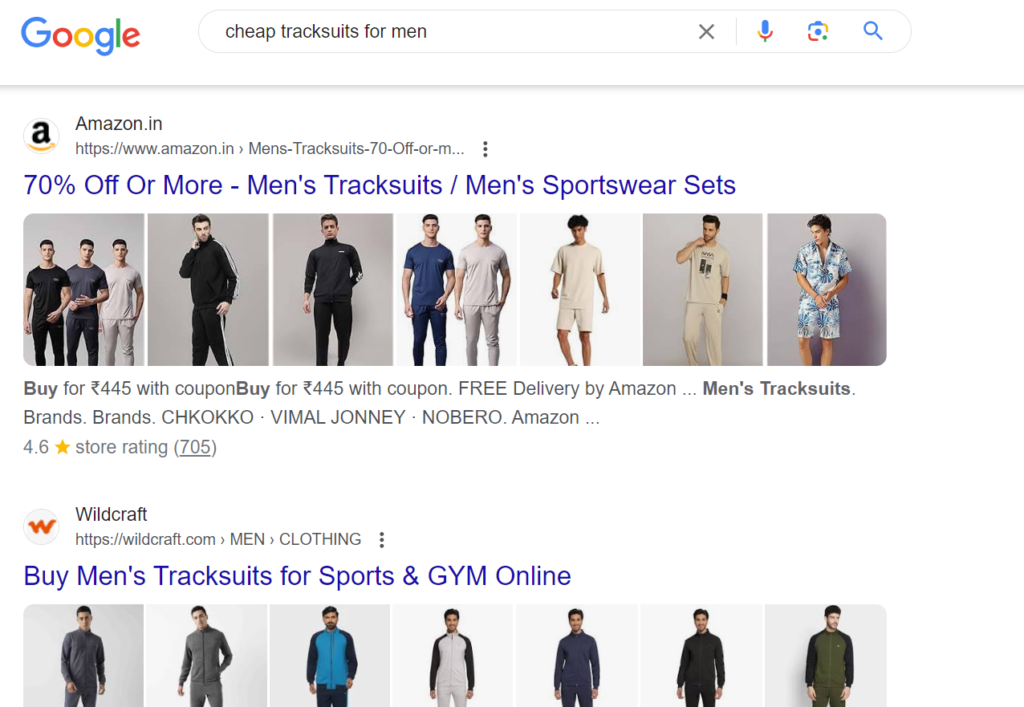
3. Overlooking Long-Tail Keywords
Long-tail keywords are often overlooked, yet they can be a goldmine for advertisers looking to optimise their Google Ads campaigns. These phrases usually consist of three or more words and typically have lower competition, making them easier to rank for and more cost-effective in the long run. By ignoring long-tail keywords, you’re committing one of the common Google Ads keyword research mistakes that can prevent you from attracting specific, intent-driven traffic, leading to missed conversion opportunities and lower ROI.
Why This is a Mistake:
Neglecting long-tail keywords is one of the common Google Ads mistakes that can lead to missed opportunities. By overlooking these specific, intent-driven phrases, you miss out on targeted traffic that can significantly boost your conversion rates. Long-tail keywords often lead to higher conversion rates as they target users closer to making a purchase decision. For example, someone searching for “Luxury beach resorts in the Caribbean for couples” is likely further along in the buying process than someone simply searching for “resorts.” By ignoring these keywords, you may inadvertently target a broader audience that is less likely to convert.
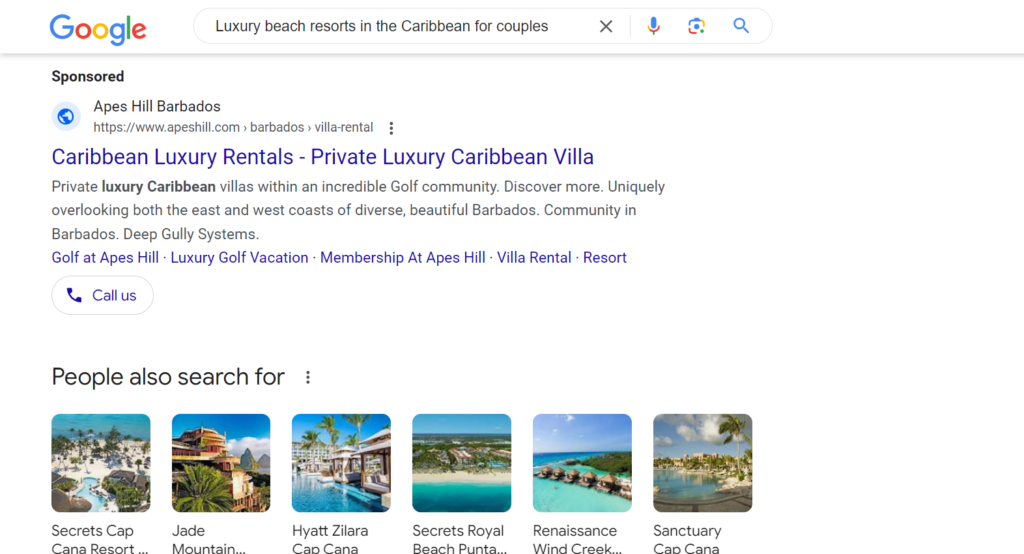
How to Avoid This Mistake:
- Identify Long-Tail Opportunities:
Use keyword research tools to find long-tail variations of your primary keywords. For instance, instead of just “moisturiser,” consider phrases like “best organic moisturiser for sensitive skin” or “affordable moisturiser for dry skin.” This strategy is especially valuable for eCommerce PPC campaigns, where specificity can lead to better targeting and higher ROI. - Incorporate Long-Tail Keywords in Ad Copy:
Ensure your ad copy reflects the long-tail keywords you are targeting. This practice improves ad relevance and can lead to better Quality Scores. Including these keywords not only makes your ads more appealing but also aligns with the best Google Ads strategies for 2024, focusing on user intent, user experience and relevance. - Create Landing Pages for Long-Tail Keywords:
Develop specific landing pages that align with your long-tail keywords. This approach increases the likelihood of conversions by delivering relevant content. By tailoring your landing pages to address the specific needs associated with long-tail searches, you can enhance the user experience and improve your overall digital marketing effectiveness.
By focusing on long-tail keywords, you can tap into a wealth of targeted traffic, ultimately improving your PPC strategies and driving more conversions for your business.
4. Failing to Conduct Thorough Keyword Research
Keyword research should be an ongoing process, but many advertisers fail to invest enough time in it. A lack of thorough research can result in missed opportunities and inefficient campaigns ultimately affecting your digital marketing efforts.
Why This is a Mistake:
Relying on gut feeling or a small set of keywords can limit your reach and effectiveness. Without comprehensive research, you risk overlooking valuable keywords that could drive significant traffic to your online ads and improve your overall PPC management.
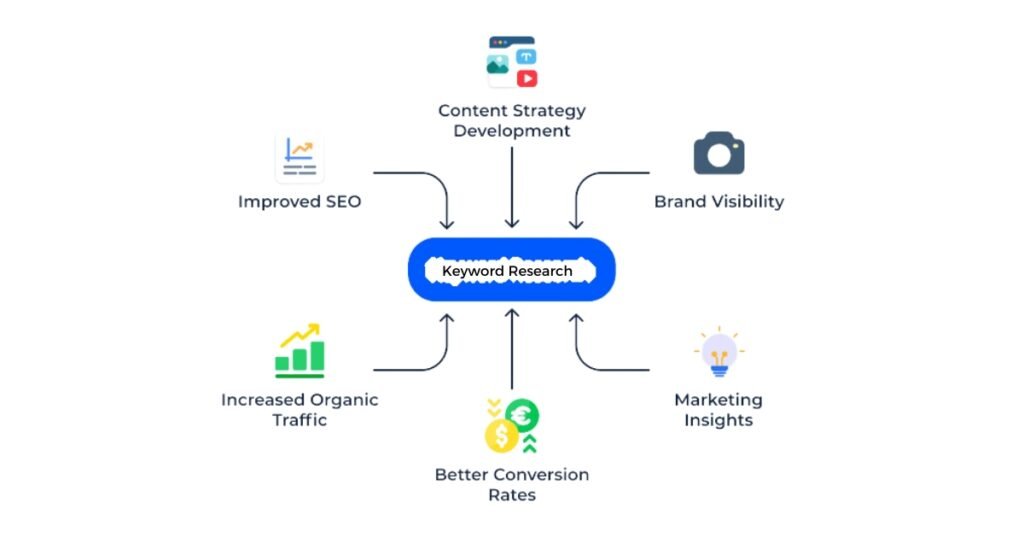
How to Avoid This Mistake:
- Analyse Search Intent: Consider the intent behind the keywords you target. Understand whether users are seeking information, comparing products or ready to purchase and tailor your strategies accordingly. This understanding is crucial for developing effective advertising strategies.
- Regularly Review Keyword Performance: Monitor your keywords’ performance and make adjustments based on their effectiveness. Be prepared to replace underperforming keywords with new opportunities that may arise in the ever-evolving landscape of online advertising.
5. Not Segmenting Keywords by Intent
Segmenting keywords based on user intent, whether informational, navigational, commercial, or transactional, is crucial for effective campaign targeting.
Keyword intent, also known as search intent, is the purpose behind a user’s search query. It’s what the user is likely to do or find when they search for a specific phrase.
Why This is a Mistake:
Failing to segment keywords leads to misaligned ad messaging and landing pages. This disconnection can confuse potential customers and result in lower conversion rates, affecting your campaign management.
How to Avoid This Mistake:
- Create Keyword Groups by Intent: Organise your keywords into distinct groups based on user intent. For example, create separate campaigns for informational queries and those aimed at conversions. This segmentation is vital for optimising your PPC advertising.
- Tailor Ad Copy to Intent: Ensure your ad copy aligns with the intent of the keywords in each group. Use clear calls-to-action that resonate with users’ specific needs and drive engagement. This tactic is essential for enhancing the relevance of your digital ads.
- Develop Targeted Landing Pages: Create unique landing pages for each intent type, optimising the content and calls-to-action to match user expectations. This practice not only improves the user experience but also boosts the effectiveness of your customer acquisition strategies.
6. Not Monitoring Keyword Performance Regularly
Many advertisers set up their campaigns and then forget about them, neglecting to monitor keyword performance regularly.

Why This is a Mistake:
Not monitoring keyword performance can lead to missed opportunities for optimization. You may continue spending on underperforming keywords while ignoring those that could drive better results in your Google Ads campaigns.
How to Avoid This Mistake:
- Set Up Regular Performance Reviews: Schedule weekly or bi-weekly reviews of your keyword performance. Analyse metrics such as click-through rate (CTR), cost-per-click (CPC) and conversion rates to ensure you’re on track.
- Use Automated Rules: Utilise Google Ads automated rules to pause or adjust bids for underperforming keywords. This feature can help you manage your campaigns efficiently and save on digital advertising costs.
- Stay Flexible: Be willing to adapt your strategies based on performance data. Don’t be afraid to shift your budget toward high-performing keywords that align with your e-commerce marketing strategies.
7. Relying Solely on Broad Match Keywords
Broad-match keywords can generate a lot of traffic, but they may not always be relevant to your business. Relying solely on them can lead to inefficiencies in your overall campaign strategy.
Why This is a Mistake:
Broad match keywords may trigger ads for unrelated queries, wasting your budget on clicks that won’t convert. This strategy can dilute your overall campaign effectiveness and limit your SEM efforts.
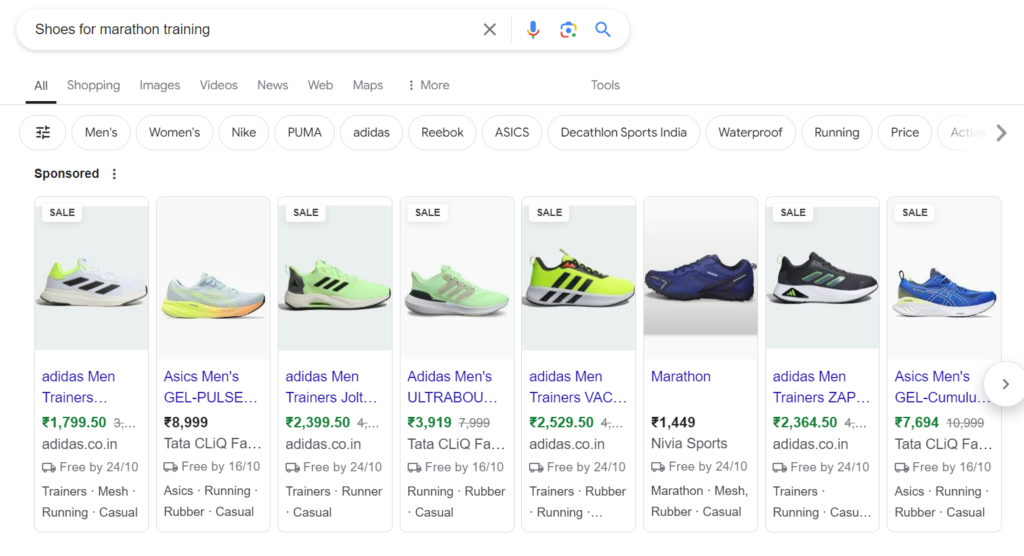
How to Avoid This Mistake:
- Incorporate Phrase and Exact Match Keywords: Use phrase and exact match types to ensure your ads appear for more relevant searches. This approach enhances targeting precision and increases the effectiveness of your PPC strategies.
- Monitor Search Terms: Regularly review the search terms report to identify irrelevant queries triggered by broad match keywords. Adjust your strategy accordingly to filter out low-quality traffic.
- Combine with Negative Keywords: Pair broad match keywords with a robust negative keyword strategy to filter out irrelevant searches. This practice can help you optimise your PPC management.
8. Ignoring Location-Based Keywords
For businesses with a physical presence or local services, neglecting location-based keywords is a missed opportunity for engagement.
Why This is a Mistake:
Ignoring location-based keywords can limit your visibility in local search results. This oversight can result in lower foot traffic and fewer local conversions, ultimately hurting your local SEO efforts.

How to Avoid This Mistake:
- Incorporate Location Modifiers: Include location-specific terms in your keywords, such as “best pizza in [City]” or “plumbing services near me.” This practice enhances your visibility in local search results and attracts nearby customers.
- Use Google My Business: Optimise your Google My Business listing to enhance local visibility. Include relevant keywords in your business description to improve local search rankings.
- Target Local Audiences with Ad Settings: Use location targeting settings in Google Ads to reach audiences in specific geographic areas. This targeting helps improve the relevance of your Google search ads.
9. Not A/B Testing Keywords and Ads
A/B testing is crucial for optimising your Google Ads campaigns, yet many advertisers overlook this practice.
Why This is a Mistake:
Without A/B testing, you may miss opportunities to identify what resonates with your audience. Not testing your ads can result in stagnant performance and wasted budget on ineffective strategies.
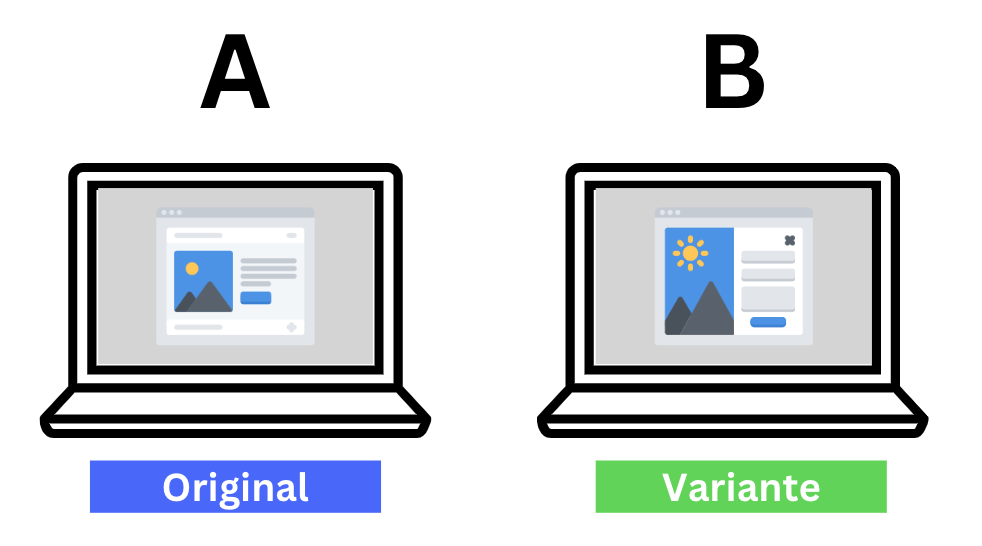
How to Avoid This Mistake:
- Set Up Regular A/B Tests: Create variations of your ads, including different headlines, calls-to-action and images. Monitor their performance to identify which versions yield the best results and drive engagement.
- Iterate Based on Results: Use the insights gained from your A/B tests to refine your ads continually. Update underperforming elements and experiment with new ideas to keep your campaigns fresh and engaging.
- Test Different Keyword Match Types: Experiment with different keyword match types to determine which generates the best results. Analyse performance metrics and adjust your bidding strategy accordingly to maximise your digital marketing ROI.
10. Not Analysing Results Post-Campaign
Many advertisers neglect to review their Google Ads keyword research Mistakes and performance metrics after a campaign ends. This oversight can lead to repeated Google Ads keyword research mistakes and missed opportunities for learning.
Why This is a Mistake:
You miss valuable insights that can inform future keyword strategies without analysing campaign results. Failing to learn from past campaigns can hinder your ability to optimise your ads for better performance next time.
How to Avoid This Mistake:
- Conduct Post-Campaign Reviews: After your campaigns end, analyse the data to understand what worked and what didn’t. Look at metrics such as CTR, conversion rates and cost per conversion to identify trends and areas for improvement.
- Update Your Keyword Strategy: Use insights from your analysis to update your keyword lists, ad copy and targeting strategies for future campaigns. Continuous learning and adaptation are essential for long-term success in ecommerce PPC.
- Document Learnings: Keep a record of your findings and insights for future reference. This documentation can serve as a valuable resource to inform your digital marketing strategies and campaign tactics going forward.
11. Focusing Too Much on Volume Instead of Intent
Why This is a Mistake:
While high-volume keywords can attract a lot of traffic, they don’t always translate to conversions. Focusing solely on search volume often leads to targeting keywords that may not align with the user’s intent, resulting in wasted ad spend and lower ROI. For instance, a keyword with high traffic might attract users who are simply browsing rather than those ready to make a purchase.
How to Avoid This Mistake:
- Understand User Intent: Break down keywords into categories: informational, navigational, commercial and transactional. Prioritise keywords that reflect the intent of your target audience. For example, focus on “buy running shoes” (transactional) rather than just “running shoes” (informational).
- Conduct Thorough Research: Utilise tools like Google Keyword Planner to analyse not only the search volume but also the intent behind the keywords. Look for keywords that align with what your customers are actually looking to do. Consider employing keyword research strategies for Google Ads to pinpoint the most effective terms.
- Test and Optimise: Regularly test your chosen keywords in campaigns and monitor which ones drive the most conversions. Shift your focus toward high-intent keywords that demonstrate a strong likelihood of leading to sales or sign-ups.
12. Not Reviewing Keyword Performance Metrics
Why This is a Mistake:
Failing to regularly review Google Ads keyword research mistakes and performance metrics can lead to poor campaign decisions. Without analyzing how your keywords are performing, you might continue to spend money on ineffective keywords while missing opportunities for improvement. Metrics like CTR (Click-Through Rate), conversion rate, and Quality Score are vital for understanding the effectiveness of your keywords.
How to Avoid This Mistake:
- Set Up Regular Reviews: Establish a routine for reviewing keyword performance, such as weekly or monthly audits. This practice helps identify underperforming keywords that may need adjustments or removal.
- Use Analytics Tools: Leverage tools like Google Analytics and Google Ads reports to track performance metrics. Pay attention to metrics such as conversions, clicks and average CPC (Cost Per Click).
- Make Data-Driven Decisions: Use the insights gained from your performance reviews to refine your keyword strategy. Pause or remove low-performing keywords and allocate the budget to high-performing ones that yield better ROI. Implement insights from Google Ads keyword research to enhance performance.
13. Ignoring Seasonal Trends
Why This is a Mistake:
Ignoring seasonal trends can result in missed opportunities to capitalise on fluctuating demand. Many industries experience seasonal peaks and valleys and failing to adjust your keyword strategy accordingly can lead to ineffective campaigns. For example, keywords related to holiday shopping will see increased search volume during the holiday season but may drop significantly afterwards.
How to Avoid This Mistake:
- Analyze Historical Data: Use historical performance data to identify seasonal trends in your industry. Look for patterns in search volume and adjust your keyword strategy accordingly.
- Utilise Google Trends: Tools like Google Trends can provide insights into seasonal keyword variations. Monitor trending searches to align your keyword strategy with peak times for demand.
- Create Seasonal Campaigns: Develop specific campaigns focused on seasonal events or trends. For instance, if you sell winter clothing, create targeted ads leading up to winter and adjust them as the season changes. Consider optimising your campaigns with Google search ads tailored to seasonal trends and incorporate effective holiday marketing strategies to maximise engagement and sales during peak periods.
14. Forgetting About Mobile Optimization
Why This is a Mistake:
With a significant portion of searches occurring on mobile devices, neglecting mobile optimisation can severely impact your keyword strategy. Keywords that perform well on desktop may not have the same results on mobile due to differences in user behaviour and search intent. Not optimising for mobile can lead to a poor user experience and lower conversion rates.
How to Avoid This Mistake:
- Conduct Mobile Keyword Research: Analyse how keywords perform on mobile devices separately from desktops. Use tools to identify mobile-specific search behaviour and adjust your strategy accordingly.
- Optimise Landing Pages for Mobile: Ensure that your landing pages are mobile-friendly. Fast loading times, responsive design and easy navigation are crucial for retaining mobile users for longer terms.
- Test Mobile Ad Copy: Tailor your ad copy for mobile users by using concise, clear messaging that fits small screens. Incorporate click-to-call features for users who may want to contact your business directly. Implement Google Ads bidding strategies in 2024 to improve mobile campaign performance.
15. Failing to Use Keyword Research Tools
Why This is a Mistake:
Relying solely on intuition or manual research without utilising keyword research tools can lead to incomplete or inaccurate keyword lists. Without these tools, you may miss valuable keyword opportunities that could drive traffic and conversions. Tools provide insights into search volume, competition and related keywords that manual methods may overlook.
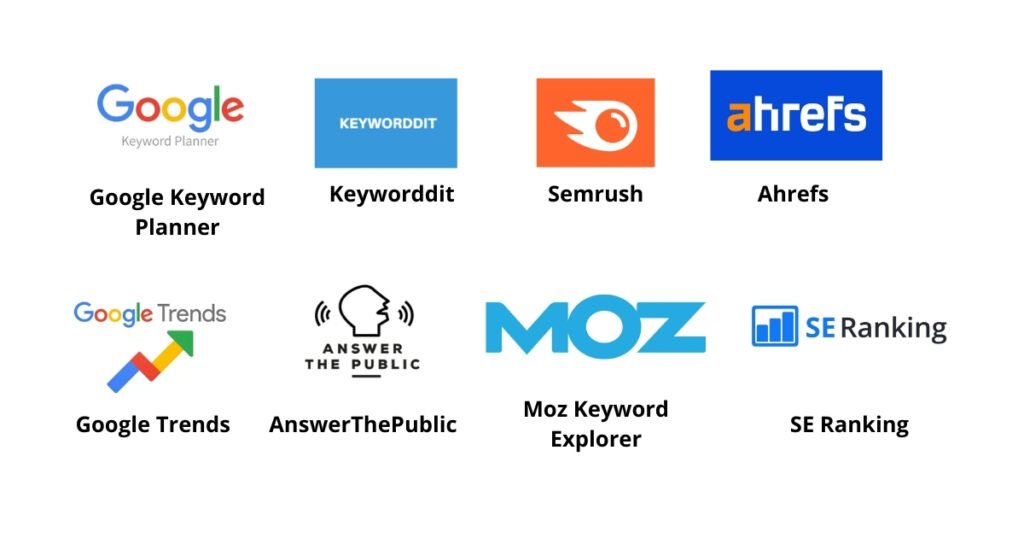
How to Avoid This Mistake:
- Explore Various Tools: Familiarise yourself with various keyword research tools such as Google Keyword Planner, SEMrush, Ahrefs and Ubersuggest. Each tool offers unique insights that can enhance your keyword research process.
- Integrate Data from Multiple Sources: Use data from different tools to get a comprehensive view of keyword opportunities. This practice helps identify high-potential keywords that may not be apparent from a single source.
- Stay Updated on Tool Features: Regularly check for updates or new features in keyword research tools, as they are continuously evolving. Utilising the latest features can provide you with advanced insights into keyword performance.
How We Helped Barbarella Hair Salon Thrive
When Barbarella Hair Salon approached us, they wanted to generate more leads and improve their online visibility. We recognized that the key to success lay in targeted keyword strategies for their Search Campaigns. By focusing on highly relevant and specific keywords related to hair salon services, we ensured that their ads reached potential clients actively searching for those services in their area.
With careful keyword research and by avoiding common Google Ads keyword mistakes, we were able to maximize the campaign’s efficiency. This strategic approach delivered exceptional results:
- Investment: CA$443.91
- Leads Generated: 171 in just 4 weeks
- Cost Per Acquisition (CPA): Reduced by 50%, from CA$5.20 to CA$2.59
This case demonstrates how powerful the right keywords can be. By using a precise keyword strategy, we not only boosted lead generation but also significantly lowered the cost per acquisition, ensuring Barbarella Hair Salon reached the right audience while optimizing their ad spend.
At Magic Clickz – a rated Digital Marketing Agency, we’re proud to be part of Open Water’s journey, helping them quench the thirst of their growing customer base!
Ready to elevate your advertising game?
At Magic Clickz, we pride ourselves on being the best digital marketing agency in Indore. Our team specialises in complete keyword research for Google Ads, ensuring that you target the right audience with precision. We understand the importance of effective advertising strategies, which is why we also offer comprehensive Google Ads management services.
As the leading PPC management agency, we’ve collaborated with a wide range of brands, achieving remarkable results and helping them maximise their return on ad spend (ROAS). Our proven track record speaks for itself and we are excited to assist you in reaching your business goals.

Contact us today for a free consultation! Let us show you how our ROI-driven digital marketing strategies can transform your campaigns and drive significant growth for your business. Whether you need assistance with Google Ads bidding strategies or insights into the latest keyword research strategies for Google Ads, we’re here to help you every step of the way!
FAQs
What is keyword research for Google Ads and why is it important?
Keyword research for Google Ads is the process of identifying and analysing search terms that users enter into search engines. This process is crucial because it helps advertisers target the right audience. By understanding what potential customers are searching for, businesses can create highly relevant ads that resonate with users’ needs and intents. Proper keyword research strategies for Google Ads ensure that your ads appear when users are actively looking for products or services, leading to higher click-through rates (CTR) and conversions. Ignoring keyword research can result in wasted ad spending on irrelevant clicks, ultimately impacting your ROI.
How can I identify long-tail keywords for my Google Ads campaigns?
To understand how to do keyword research, focus on finding long-tail keywords that are specific phrases usually containing three or more words. You can use keyword research tools like Google Keyword Planner, SEMrush, or Ahrefs. These tools allow you to explore variations of your main keywords and analyse their search volume, competition and relevance. For example, instead of targeting a broad keyword like “beauty products,” consider long-tail phrases such as “organic beauty products for sensitive skin” or “affordable anti-ageing skincare products.” By focusing on keyword research strategies for Google Ads, you can attract more qualified traffic and improve conversion rates, as users searching for these specific terms are often further along in the purchasing process.
What are the common mistakes to avoid when managing Google Ads?
Managing Google Ads can be complex and several common mistakes can hinder your campaign’s success. Some of these include:
- Focusing too much on high-volume keywords: While these can drive traffic, they may not align with user intent, leading to low conversion rates.
- Neglecting long-tail keywords: These can capture targeted traffic and often yield higher conversions.
- Not regularly reviewing performance metrics: Failing to analyse CTR, conversion rates, and other key metrics can prevent you from making data-driven decisions.
- Ignoring seasonal trends: Adjusting your keyword strategy to reflect seasonal demand can significantly impact campaign effectiveness.
- Overlooking mobile optimization: Since a large portion of searches occur on mobile devices, ensuring your ads and landing pages are mobile-friendly is critical. By being aware of these pitfalls and regularly optimising your campaigns, you can enhance your overall Google Ads performance and avoid common Google Ads mistakes.
What should I consider when creating landing pages for my Google Ads campaigns?
Landing pages play a crucial role in converting clicks into customers. When creating landing pages for your Google Ads campaigns, consider the following:
- Relevance: Ensure that your landing page content aligns with the keywords and ad copy used in your campaign. This relevance increases the likelihood of conversions.
- User experience: Design your landing page for easy navigation, fast loading times, and mobile responsiveness. A seamless user experience can significantly impact conversion rates.
- Clear calls-to-action (CTAs): Include strong, compelling CTAs that guide users toward the desired action, whether that’s making a purchase, signing up for a newsletter, or requesting more information.
- A/B testing: Experiment with different landing page designs, copy and CTAs to determine what resonates best with your audience. Regular testing can help optimise your landing pages for better performance. By focusing on these elements, you can create landing pages that attract visitors and encourage them to take action, ultimately improving your Google Ads campaign’s ROI.
How can seasonal trends affect my Google Ads strategy?
Seasonal trends can significantly impact consumer behaviour and search volume, making it essential to adapt your Google Ads strategy accordingly. For example, keywords related to holiday shopping often see increased search volume during the holiday season, while others may experience drops in demand during off-peak times. To capitalise on seasonal trends:
- Analyse historical data: Review past performance to identify patterns in keyword searches during specific times of the year.
- Utilise Google Trends: This tool provides insights into seasonal keyword variations, allowing you to align your strategy with peak demand times.
Create targeted campaigns: Develop campaigns focused on seasonal events or trends to capture relevant traffic and boost conversions. By being proactive and adjusting your keyword strategy to reflect seasonal changes, you can maximise your advertising efforts and drive better results for your Google Ads campaigns.


